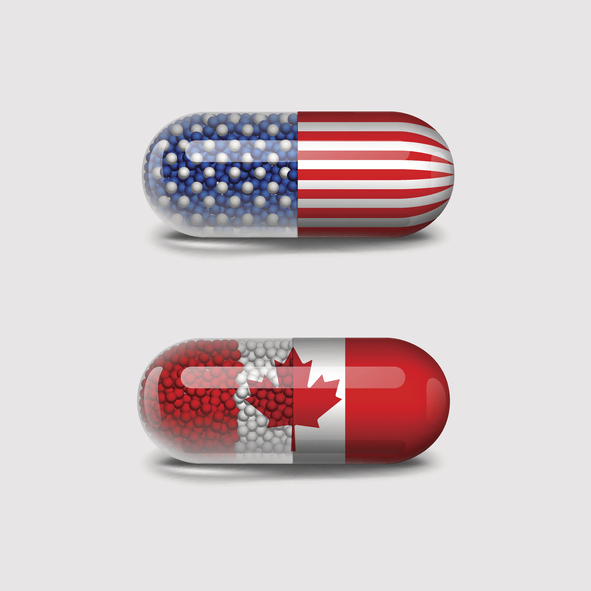The U.S. Food and Drug Administration (FDA) authorized Florida’s plan to import drugs from Canada, a first for the agency that could save patients millions of dollars, on January 5.
However, the program limits access to individuals enrolled in certain state programs run by the Agency for Persons with Disabilities, the Department of Children and Families, the Department of Corrections, and the Department of Health, and restricts the number of drugs they can get. Medicaid recipients will receive access at a later date.
Even after FDA approval, the Sunshine State faces some major hurdles to implement its program. Requirements include a “pre-import request” for each imported drug, which must be approved by the FDA before ordering, and adherence to quality testing and labeling standards of any medications received through the program.
FDA Delayed Approval
The FDA approval came after a 2022 lawsuit Florida brought against the Biden administration for “slow walking” the state’s request. Speaking on the reason for the lawsuit, Florida Gov. Ron DeSantis pointed to FDA delays in approving the import program.
“The lack of transparency by the Biden administration during the approval process, and failure to provide records on the importation proposal, is costing Floridians who are facing rising prices across the board due to inflation,” said DeSantis, at a press conference. “Florida is confident in our importation model, and we continue to look for more ways to lower drug costs for Floridians while the FDA delays approval of this importation approval.”
Resistance from Canada
Gregg Girvan, a Foundation for Research on Equal Opportunity (FREOPP) resident fellow, says he is skeptical the program will achieve its aims.
“I am doubtful anticipated savings will be realized right away, if ever,” said Girvan. “Canadian officials have made it clear that they will not allow themselves to be the pharmacy of the United States and risk their drug supply; it is therefore unknown whether Florida will even be able to obtain the drug supply it needs. Lack of availability of certain branded drugs in Canada and complex and expensive administration stateside could also serve as roadblocks.”
Florida is one of a handful of states, including Colorado and Texas, that decided to purchase Canadian drugs after the Trump administration authorized importation through a rule in 2020. Texas approved an import program in 2023. Colorado submitted an importation application in 2022 but plans to submit a revised version some time this year.
A report from the Colorado legislature cited several “significant challenges” to the implementation of its plan, including medication availability, resistance from drug makers, and “regulatory ambiguity” at the federal level.
More Roadblocks
“The program is a waste of time and money, regardless of the bureaucracy,” said Wayne Winegarden, director of the Pacific Research Institute’s Center for Medical Economics and Innovation. “Drug importation won’t work on a practical level. Canada does not have enough drugs to serve the U.S. market…it will not be possible to import from Canada on a practical basis.”
The risk of non-Canadian imposter drugs entering states’ programs is yet another efficacy and safety concern, says Winegarden.
U.S. drug vendors could be another deterrent to access. LifeScience Logistics, which is being paid more than $39 million to manage Florida’s plan, is chaired by former Health and Human Services Secretary Alex Azar. Azar’s work as a pharmaceutical executive before his appointment has raised conflict of interest concerns.
“We don’t know how the pharmaceutical industry is going to respond behind the scenes,” said Girvan. “One could envision drug companies negotiating higher prices in the Canadian market with the anticipation that some of their products will end up in American patients’ hands.”
Stateside Market Better
Brand-name drugs are much cheaper in Canada, but most medicines prescribed in the United States are generics, which are less competitively priced in Canada due to manufacturing limits and price controls.
“The U.S. market for generics is much more efficient than in other countries, and 90 percent of all medicines prescribed are generics,” said Winegarden. “These medicines cost, on average, around $20 per prescription so are generally affordable. There are also innovations in how generics are sold that demonstrate a better pro-market approach to promoting greater drug affordability.”
Drug importation is fundamentally backward and could create the same exploitive anti-market as countries with price controls and ultimately harm consumers, says Winegarden.
“Canada and all of the other countries that impose price controls are expropriating revenues from U.S. pharmaceutical companies,” said Winegarden. “The problem of U.S. consumers funding drug innovation for the world should be negotiated into trade agreements.”
Avoiding Price Controls
“Part of the issue here is that Florida is trying to obtain access to bulk amounts of drugs from Canada,” said Girvan. “This is different in scope than an individual purchasing a drug from a Canadian pharmacy and having it mailed to themselves, hence the program is far more complex.”
A bill currently advancing in Florida’s House may prove a better alternative to the state’s “stutter step” importation program.
House Bill 1431, International Drug Reference Pricing, would implement a proposal like FREOPP’s Market-Based International Index. This program ties the prices paid for drugs to a group of industrialized countries, with the important caveat that countries with single-payer health care systems are excluded, says Girvan.
“This proposal would align what Florida pays with countries that support drug innovation and would drive down the cost of brand-name drugs without the expensive overhead or supply-chain risks of the drug importation program,” said Girvan.
Ashley Bateman (bateman.ae@googlemail.com) writes from Virginia.
